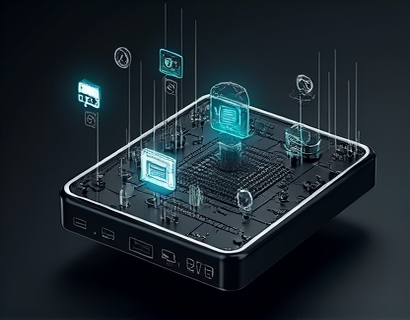AI-Powered Healthcare: Revolutionizing Access to Personalized Medical Insights and Expert Advice Online
In the rapidly evolving landscape of healthcare, the integration of artificial intelligence (AI) is transforming the way individuals access and utilize medical information. This shift towards AI-powered healthcare solutions offers unprecedented opportunities for personalized medical insights and expert advice, all available at one's fingertips through advanced online platforms. The advent of these technologies marks a significant milestone in the journey towards more informed, proactive, and efficient healthcare management.
The Need for Personalized Healthcare Solutions
Traditional healthcare models often struggle to provide personalized care due to the vast array of individual health needs and the limitations of human resources. Each person's genetic makeup, lifestyle, and environmental factors contribute uniquely to their health status, necessitating tailored approaches to diagnosis, treatment, and prevention. AI-driven healthcare platforms address this gap by leveraging vast datasets and sophisticated algorithms to deliver customized medical insights and advice, ensuring that individuals receive care that is both relevant and effective.
How AI Enhances Medical Decision-Making
AI technologies, including machine learning and natural language processing, enable the analysis of complex medical data with speed and accuracy surpassing human capabilities. These systems can process extensive medical literature, patient histories, and real-time health data to provide instant, evidence-based recommendations. For instance, AI can assist in diagnosing conditions by analyzing symptoms, suggesting potential causes, and even predicting disease progression, thereby empowering both healthcare providers and patients with valuable information.
Instant Access to Personalized Medical Insights
One of the most compelling benefits of AI-powered healthcare platforms is the ability to access personalized medical insights instantly. Users can input their symptoms, medical history, and other relevant information into these systems, which then generate tailored advice and potential health concerns. This immediate access to expert-level information democratizes healthcare, allowing individuals to take charge of their health management and make informed decisions without waiting for appointments or consultations.
User Experience and Interface
The design of these platforms prioritizes user experience, ensuring that the interface is intuitive and easy to navigate. Clear prompts guide users through the process of inputting their information, and the results are presented in a comprehensible format. Visual aids, such as charts and graphs, help users understand complex medical concepts and data, making the information more accessible and actionable.
Expert Advice at Your Fingertips
Beyond instant insights, AI-powered healthcare platforms connect users with a network of medical experts for further consultation. Through secure messaging, video consultations, and remote monitoring, users can receive ongoing support and guidance from healthcare professionals. This hybrid model combines the convenience of digital platforms with the expertise of human practitioners, ensuring that users have access to both immediate and in-depth medical advice.
Building Trust Through Credibility
To ensure the reliability of the advice provided, these platforms rigorously vet their medical experts and sources. Collaborations with reputable medical institutions and adherence to strict privacy and security standards further enhance user trust. By maintaining high standards of accuracy and credibility, AI-powered healthcare platforms establish themselves as valuable resources in the digital health ecosystem.
Data-Driven Health Management
The true power of AI in healthcare lies in its ability to transform raw data into actionable insights. By continuously learning from user interactions and health outcomes, these platforms refine their algorithms to provide more accurate and personalized recommendations over time. This data-driven approach not only enhances the quality of care but also promotes preventive health measures by identifying risk factors and suggesting lifestyle adjustments.
Predictive Analytics and Early Intervention
AI's predictive capabilities are particularly valuable in early disease detection and intervention. By analyzing patterns in health data, AI can identify potential health issues before they become severe, allowing for timely intervention. This proactive approach can significantly improve health outcomes and reduce the overall burden on healthcare systems.
Enhancing Patient Provider Communication
The integration of AI in healthcare also streamlines communication between patients and providers. Digital platforms can facilitate the sharing of medical records, test results, and treatment plans, ensuring that all parties have access to the most up-to-date information. This seamless exchange of data fosters better collaboration and more coordinated care, ultimately leading to improved patient satisfaction and health outcomes.
Breaking Down Barriers to Care
AI-powered healthcare solutions have the potential to bridge gaps in access to medical care, particularly in underserved or remote areas. By providing instant access to expert advice and reliable information, these platforms help level the playing field, ensuring that individuals from all backgrounds can benefit from high-quality healthcare. This democratization of medical knowledge and resources is a significant step towards achieving universal health coverage.
Challenges and Considerations
While the benefits of AI in healthcare are undeniable, there are also challenges and considerations that must be addressed. Ensuring data privacy and security remains paramount, as sensitive health information is handled. Transparency in how data is used and stored, along with compliance with regulations such as HIPAA, is essential to maintaining user trust. Additionally, the integration of AI should complement, not replace, human expertise, emphasizing the importance of a balanced approach to healthcare delivery.
Ethical Use of AI
The ethical use of AI in healthcare involves addressing biases in algorithms, ensuring equitable access to technology, and maintaining the patient-provider relationship. Developers and healthcare providers must work together to create systems that are fair, inclusive, and respectful of individual rights. Continuous monitoring and evaluation of AI systems are necessary to identify and mitigate any adverse effects.
The Future of AI in Healthcare
As AI technology continues to advance, its role in healthcare is poised to expand even further. Future developments may include more sophisticated predictive models, enhanced virtual reality for therapy and training, and deeper integration with wearable devices for real-time health monitoring. The potential for AI to transform healthcare is vast, promising a future where personalized, proactive, and precise care becomes the norm.
Conclusion
The convergence of AI and healthcare represents a paradigm shift in how we approach medical care. By providing instant access to personalized medical insights and expert advice, AI-powered platforms empower individuals to take control of their health and well-being. As these technologies continue to evolve, they will play an increasingly vital role in shaping the future of healthcare, making it more accessible, efficient, and effective for all.










































